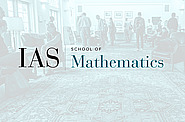2019-2020 Seminars
Mar
03
2020
Computer Science/Discrete Mathematics Seminar II
An introduction to Boolean Function Analysis
Dor Minzer
10:30am|Simonyi Hall 101
Mar
02
2020
Computer Science/Discrete Mathematics Seminar I
An Improved Cutting Plane Method for Convex Optimization, Convex-Concave Games and its Applications
11:00am|Simonyi Hall 101
Feb
27
2020
Computer Science/Discrete Mathematics Seminar II
Spectral Independence in High-dimensional Expanders and Applications to the Hardcore Model
Kuikui Liu
2:30pm|Simonyi Hall 101
Feb
27
2020
Theoretical Machine Learning Seminar
Preference Modeling with Context-Dependent Salient Features
12:00pm|Dilworth Room
Feb
25
2020
Theoretical Machine Learning Seminar
Learning from Multiple Biased Sources
Clayton Scott
12:00pm|Dilworth Room
Feb
25
2020
Computer Science/Discrete Mathematics Seminar II
Is the variety of singular tuples of matrices a null cone?
10:30am|Simonyi Hall 101
Feb
24
2020
Computer Science/Discrete Mathematics Seminar I
Strong Average-Case Circuit Lower Bounds from Non-trivial Derandomization
Lijie Chen
11:00am|Simonyi Hall 101
Feb
20
2020
Theoretical Machine Learning Seminar
Geometric deep learning for functional protein design
Michael Bronstein
12:00pm|Dilworth Room
Feb
18
2020
Computer Science/Discrete Mathematics Seminar II
An invitation to invariant theory
10:30am|Simonyi Hall 101
Feb
13
2020
Theoretical Machine Learning Seminar
The Lottery Ticket Hypothesis: On Sparse, Trainable Neural Networks
Jonathan Frankle
12:00pm|Dilworth Room
